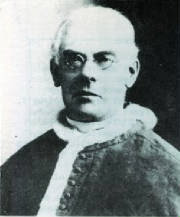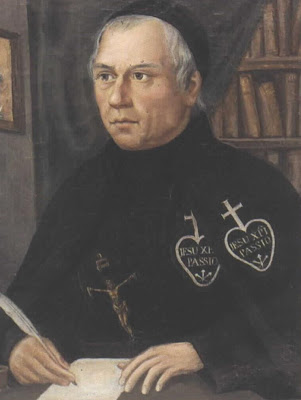On taking a teaching post at St. Alexander's school, Bootle, Teresa became the penitent of Fr. Edward Powell, the first of two spiritual directors who were to be her guides for the rest of her life. Both these priests had daily opportunity of knowing Teresa in school and the parish and would have heard many of the accusations made against her when she became an object of controversy. Yet neither wavered in their belief in her. What calibre of men were they?
St. Alexander, Bootle, with the school to the left
Fr. Edward Powell (1837 - 1901) early showed a talent for languages and as a student in Rome had won a gold medal in Hebrew against all comers. After ordination he returned to the Liverpool diocese and became secretary to Bishop Goss. As a young priest he volunteered to minister to victims of a fever then raging, took it himself and for two weeks lay at death's door. In 1866 he was appointed to the new mission of St. Alexander's and afterwards made priest - in - charge. During 13 years of incessant toil he built the church, school and presbytery, and on being transferred to Lydiate worked with like zeal there. He was a devoted shepherd to his flock - in the pulpit, at the altar, in the people's homes, with a zeal that drove him out to the highways and byways. His piety was deep and his austerities included the discipline and hairshirt. After his death his confessor declared his belief that he had never stained his baptismal innocence by any deliberate venal sin, and said that as a confessor and director of souls he had discharged his duties "to the utmost perfection of his gifts".
Fr. Edward Powell
Such was the priest who guided Teresa during her early years at St. Alexander's and put her under obedience to write out her life and spiritual experiences.
When in 1883 Bishop O'Reilly ordered Fr. Powell to cease his direction of Teresa the latter's curate Fr. Alfred Snow assumed the task, not without heart - searching and prayer. Recognising the responsibility of guiding a soul being led by extraordinary paths he set himself to the study of mystical theology. I am afraid I can offer no more details about Fr. (later Canon) Snow than can be found in the books, but we know that in addition to undoubted piety he possessed administrative gifts that led to his being appointed chancellor of the archdioscese. And as well as being a confessor to Teresa he was a most constant practical friend, e.g. it was Fr. Snow was secured for her a haven in St. Catherine's convent, Edinburgh, where his sister was Mother Superior. On his deathbed in 1922 he declared to Archbishop Keating "I feel it right to say that I have the firm conviction that Teresa Higginson was not only a saint but one of the greatest saints Almighty God has raised up in his church."
Canon Alfred Snow
Our two main witnesses to Teresa's life in Bootle are Margaret (Minnie) Catterall and Helen Nicholson who later became Mrs. Lonsdale. Both remained life-long friends and after death stalwart activists in her cause, giving their testimony under oath and leaving written memoirs. Isabella Arkwright said that when she and they got together to talk about Teresa they would allow themselves three hours and then felt they had "only touched the surface". Particularly valuable is the testimony of Miss Catterall who shared accommodation with Teresa, taught in the same school and often accompanied her on parish visits. In her memoir published as "Minnie Catterall's Narrative" in 1936 she writes:
"I have never before or since seen of known anyone like her - a veritable model of perfection in all circumstances, the very essence of humility, a well of goodness and love of God. In my mind she stands as the greatest handmaid of God's saints - in her ardent humility, in her intense love of her Spouse in the Blessed Sacrament, in her love of sufferings for His sake, and her complete abnegation of her own dear self. The mere thought of her is one of my greatest comforts in life, and I shall ever remember what a debt of gratitude I owe to her even since her death, for the many and most remarkable favours she has gained for me."
Minnie - described by her niece as a striking personality - eventually became the headmistress of Holy Cross School, Liverpool, and in retirement lived in Wigan. She died in 1935 aged 75.
Another witness for this time is Miss Agnes Donnelly. She was then a schoolgirl but both her parents were on the staff of St. Alexander's and knew Teresa well. She writes:
"My parents always spoke of Miss Higginson as a saint ... my mother knew her for many years and spent many hours in her company. On her deathbed she suddenly said 'I wonder when the church will recognise Teresa's sanctity.'" Her father was once heard to declare "If Teresa had been in an order of nuns she would have been canonised long before this."
On leaving St. Alexander's, Teresa returned home to Neston, and after teaching in village schools , spent the following summer as a guest of Minnie and Helen who were now in charge of a school at Newchurch in Rossendale. Then we find her in Clitheroe in where she received the grace of the mystical marriage, or transforming union, with Christ.






